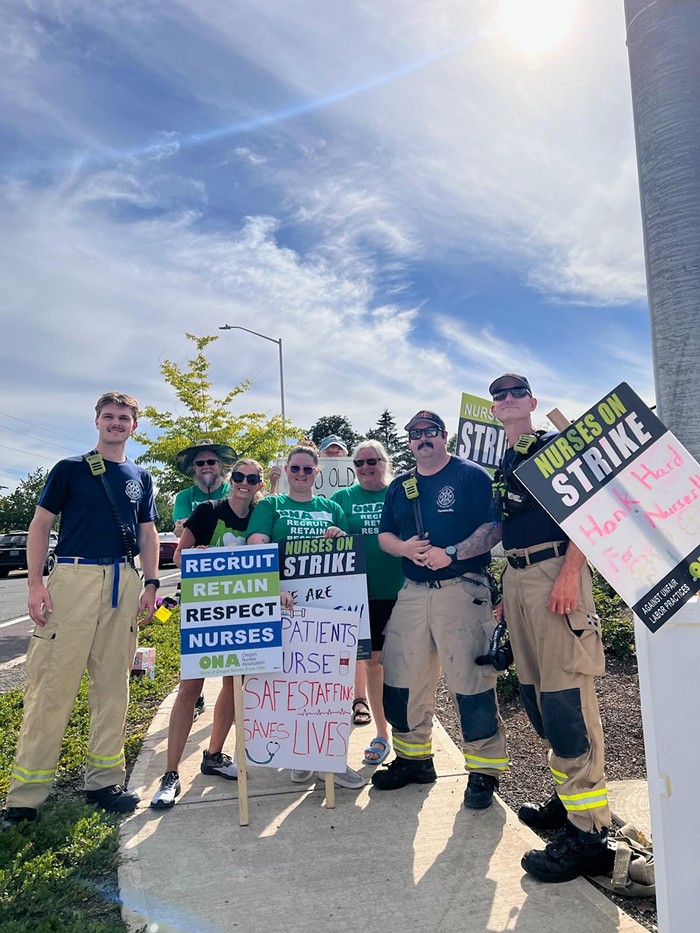Update 21 June: Providence nurses at six hospitals across the state of Oregon say they were locked out of their jobs Friday after participating in a three-day strike over stalled collective bargaining negotiations.
Currently, nurses are protesting outside Providence facilities on Friday and Saturday.
According to the Oregon Nurses Association (ONA), the union that represents Providence nurses, the Oregon Health Authority (OHA) has “confirmed violations of the Oregon Nursing Personnel Act by Providence.”
The law sets minimum staffing ratios to ensure high-quality patient care and prevent burnout among nursing staff due to an unbearable patient load.
“Providence submitted staffing plans to OHA for approval that were never approved by the nurses and that were unilaterally adopted by management without the required approval of the Nurses Personnel Committee,” ONA said in a news release Friday. “According to OHA, this action violates Oregon’s personnel law, as the nurses represented by ONA have alleged.”
Lockouts are typically initiated by employers to force union-represented employees to agree to an employment contract.
Original story below
Published: June 20, 2:06 p.m.
The strike, in which about 3,000 nurses walked off the job on Tuesday, is the state’s largest health care strike in decades. The six hospitals affected include Providence St. Vincent Medical Center on the western edge of Portland, the state’s largest hospital.
Katie Moslander, a nurse in St. Vincent’s orthopedic department, says the strike has been a positive experience so far.
“It was a difficult decision to come here. The Sunday shift was tough and I knew I wouldn’t see those patients again this week. But I felt an overwhelming sense of camaraderie in my interactions with my fellow nurses,” she says.
This is not the first strike at Providence hospitals in recent years. Last June, almost exactly a year ago, nearly 2,000 nurses in Portland and Seaside began a strike demanding better wages and benefits.
The themes of current contract negotiations between Providence and nurses represented by the Oregon Nurses Association (ONA) are similar: Nurses are demanding higher wages, lower health care costs and secure staffing levels.
One difference, however, is the impact of Oregon’s recently passed Safe Staffing Act. The law, which the ONA called “groundbreaking,” made Oregon the second state in the country to implement mandatory nurse staffing ratios and eliminated the so-called “buddy break” system that required nurses to take on their colleagues’ patient loads during their breaks.
Moslander praised the law, which came into effect on June 1, but said its introduction had unintended consequences.

Water and ice help the strikers to defy the heat. Oregon Nurses Association
By law, hospitals cannot assign more than a certain number of patients to each nurse. But Kathy Keane, a nurse at St. Vincent and chair of the nurses’ bargaining committee, says Providence has chosen to assign each nurse only the maximum number of patients allowed – without considering what level of care each patient requires.
“Their interpretation of the law is to give everyone the maximum quota, regardless of how sick a patient is,” says Keane.
The result, nurses say, is that they often lack the time to get to know patients and provide them with appropriate care. Providence, in turn, argues that if nurses have problems with the current staffing structure, it is the fault of ONA and its allied unions.
“The union declared the passage of the bill a major victory – and once again it passed with a coalition of unions and health systems,” Providence wrote in a statement released Wednesday. “If union leaders want to change the law they fought for, they should go to the legislature instead of striking over something Providence cannot change.”
Staffing is far from the only issue that continues to roil nurses and hospitals. Nurses, who negotiate their own collective bargaining agreements at each hospital, also want pay raises that they say would bring Providence up to par with other hospitals in the region.
Providence said it offered wage increases of around 10 percent in the first year of the new collective bargaining agreement at the six striking hospitals. But nurses said the increases offered in subsequent years would be only 3 percent. That is not enough to keep up with the current rate of inflation.
In any case, says Moslander, people vote with their feet.
“You can say that any amount is a competitive salary for you as a company, but when people leave, I think that’s a problem,” she says.
Health care costs are also an issue. Providence offers its own health insurance plan and covers a high percentage of premiums compared to other plans, but Keane says high deductibles and copayments have made coverage unaffordable.
“I know that in the last few weeks alone, I’ve spoken to a few nurses who had their doctors recommend certain tests for diagnostic reasons because they had various symptoms. Two of them said they decided against it because the cost was just too high,” says Keane.
Keane herself is covered by her husband’s health insurance for cost reasons, although his insurance does not offer nearly the same level of coverage as Providence’s.
Nurses argue that raises, lowering health care costs and improving staffing levels would help Providence hospitals retain their staff — which nurses say is a major problem. Nursing turnover rates across the board have skyrocketed in the wake of the pandemic, with a number of nurses leaving the profession and others changing hospitals.
Moslander believes nurses generally would rather stay in their profession than move between hospitals, but they need to be realistic about the financial incentives.
“People want to stay with their colleagues,” she says. “People want to stay where they have made their career. But for economic reasons, sometimes you just have no choice. I have three children, a lot of people are single parents – you have to do what you have to do.”
The nurses are expected to end their coordinated strike and return to work Friday. In the meantime, Providence has worked with a national firm to hire replacement workers to run its hospitals. A certain number of procedures have been postponed.
Keane hopes to return to the bargaining table after the strike ends, although no further round of negotiations between the two sides is currently planned. The two sides were in federal mediation in the spring leading up to the strike date.
The current strike at Providence, like last year’s strike and a contentious collective bargaining session at Kaiser, comes in the wake of the Covid-19 pandemic – an event that has had a devastating impact on nursing and the healthcare industry in general.
One of the consequences, says Keane, is that it has made nurses aware of their value again.
“I guess we always took it for granted that we just do what we do and that it’s no big deal, but I think we’ve finally realized that what we do is a really big deal,” Keane says. “And we’re valuable.”
Courtney Vaughn contributed to this story.



